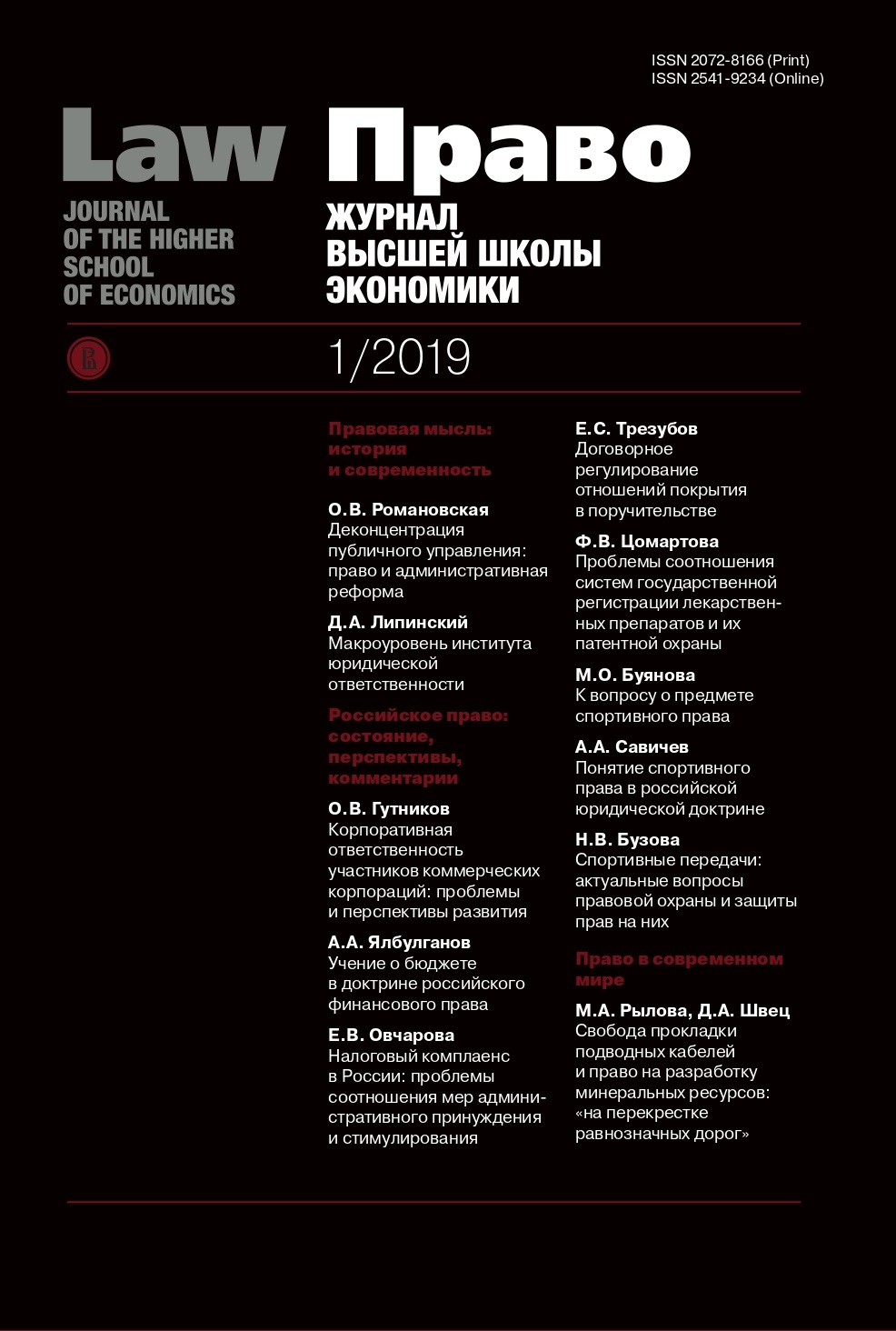Спортивные передачи: актуальные вопросы правовой охраны и защиты прав на них
Аннотация
Введя в 1993 году в российское законодательство институт смежных прав, законодатель в качестве объекта охраны, на который распространяются права организаций вещания, определил передачу. Реформа гражданского законодательства, повлекшая за собой кодификацию норм, касающихся интеллектуальной собственности, затронула и права организаций вещания. В части четвертой Гражданского кодекса объектом исключительного права организации вещания стали называть сообщение в эфир или по кабелю радио- или телепередач (вещание организаций эфирного или кабельного вещания). Однако правовой статус передач, которые транслируют организации вещания, остался не в полной мере законодательно определенным. Неоднозначен правовой статус передач и в зарубежном законодательстве. В статье обозначены правовые проблемы, возникающие не только с точки зрения теоретических подходов, но и в процессе правоприменения. Если некоторые передачи могут быть аудиовизуальными произведениями и охраняются авторским правом, то со спортивными передачами правовой определенности меньше. Поскольку использование спортивных передач создает существенный экономический эффект, увеличивается количество правонарушений посредством неправомерного использования вещания и передач. С развитием информационно-телекоммуникационных сетей такие правонарушения перемещаются в Интернет, где не урегулированы некоторые аспекты использования результатов интеллектуальной деятельности организаций вещания. Для борьбы с неправомерным использованием вещания спортивных передач в Интернете применяется «антипиратское законодательство», позволяющее налагать запреты на использования с привлечением информационных посредников, а не привлекать к ответственности нарушителей. Некоторые нарушения прав организаций вещания имеют трансграничный характер, но международно-правовой механизм, в частности, Международная конвенция об охране прав исполнителей, производителей фонограмм и вещательных организаций регулирует правоотношения по использованию передач организаций вещания на уровне 1960-х годов, не охватывая даже кабельного вещания. Необходимы решения, позволяющие в полной мере охранять вещание в Интернете как национальном, так и на международном уровне и наделять соответствующими правомочиями организациям вещания.
Литература
Albegonov Z.H. (2010) [On demand to cease violations of the rights of broadcasters as a measure of civil law protection]. Imuschestvennye otnoshenia v Rossiyskoy Federatcii, no 11, pp. 20-26 (in Russian)
Bentley L. (2004) [The Intellectual Property Rights]. Saint Petersburg: Juridical center press, 512 p. (in Russian)
Dedova E.A. (2006) Civil law protection of the neighboring rights of broadcasters. Candidate of Juridical Sciences Thesis Summary. Moscow, 25 p. (in Russian)
Grin' E. (2017) TV broadcast as object of intellectual property. Avtorskoye pravo i smezhnye prava, no 7, pp. 19-24 (in Russian)
Grishaev S.P. (2002) Media and IP copyright. Avtorskoye pravo i sredstva massovoi informatcii, no 20, pp. 123-167 (in Russian)
Hort M. (2012) [On the subject and the object of protecting rights of broadcasting entities in Russian and abroad]. Intellektualnaya sobstvennost', no 1, pp. 63-69 (in Russian)
Polovnikova Yu. (2012) [Object of neighboring rights of broadcasting entities]. Intellectualnaya sobstvennost', no 8, pp. 52-55 (in Russian)
Ponkin I.V., Redkina A.I. (2017) [Intellectual property rights in the field of football]. Intellectualnaya sobstvennost', no 5, pp. 7-14 (in Russian)
Ponkin I.V., Redkina A.I. (2017) Sports actions as object of IP rights. Kopyrite. Vestnik akademii intellektualnoi sobstvennosti, no 4, pp. 46-57 (in Russian)
Ryder R., Madhavan A. (2013) The IP strategy of India's cricket sensation. Managing IP Magazine. 2013. Available at: http://www.managingip.com/IssueArticle/3160175/Archive/The-IP-strategy-of-Indias-cricket-sensation.html (accessed: 29.05.2018)
Sudarikov S.A. (2000) [The Basics of Intellectual Property]. Minsk: Amalfea Publishers, 512 p.
Tereschenko L.K. (2011) [The Legal Regime of Information. Doctor of Juridical Sciences Thesis]. Moscow, 415 p. (in Russian)
Tkachov D.A. (2013) [Strategy of protecting rights of the India premier cricket league]. Patentnoye delo, no 5, p. 56 (in Russian)
Tuktarov Yu. E. (2000) [Broadcast as object of neighboring rights]. Zhurnal rossiyskogo prava, no 10, pp. 124-129 (in Russian)
Vlasov E.G. (2013) [Civil law protecting of broadcaster entities as object of rights. Candidate of Juridical Sciences Summary]. Moscow, 24 p. (in Russian)
Copyright (c) 2019 Право. Журнал Высшей школы экономики

Это произведение доступно по лицензии Creative Commons «Attribution-ShareAlike» («Атрибуция — На тех же условиях») 4.0 Всемирная.


















